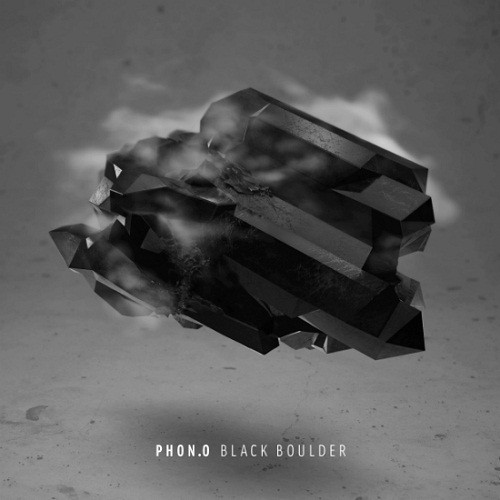50 Weapons doesn’t really have an identifiable sound. Modeselektor have amassed an infallible assembly of artists from all across dance music’s broad spectrum of styles and sounds including vets like Shed, Addison Groove, and Cosmin TRG as well as newcomers like Benjamin Damage and Doc Daneeka (not to mention the Thom Yorke-led supergroup, Atoms For Peace). If anything ties these guys together it’s their willingness to go out on a limb and climb genre barriers, which makes German producer, Phon.o, a comfortable fit.
Phon.o was signed to 50 Weapons last year, releasing a string of singles that culminated into the undeniable one-two, gut-punch of “Slavemode” and “Abbey Road.” You wouldn’t know it listening to the single, but Carsten Aermes has been putting out records as Phon.o since 2000. Black Boulder is Phon.o’s third LP, his first in seven years. Prior to 50 Weapons Aermes produced various strains of techno and deep house and after his 2005 record, Burn Down The Town, he spent a few years collaborating with Chris De Luca, trudging clear across hip-hop, breakcore, and IDM. The newest incarnation sees Aermes picking apart house-infused UK garage molds in the vein of Jacques Greene and adding his own unique touch of Berlin dub and widescreen rave to the equation. It’s seemingly an odd move from the German, especially considering how fully formed the sound on Black Boulder is, but it makes sense. Aermes’ catalogue is conspicuously barren from ’07 to ’11 and a goddamn lot has happened in that time.
Black Boulder is an immediate record. It leads with its dancefloor hooks, which are numerous and constant. Phon.o might not be pushing sounds that have never been heard before, but he has an exceedingly tight grip on cumulative structure and space. “Nightshifts” starts the record off with a smattering of twiggy percussion and a smear of downtrodden organ sounds, Phon.o steadily building the verticality of the track over four and a half minutes, managing to bump things up against the ceiling at its pinnacle. “Twilight”, one of two vocal-centric tracks on Black Boulder, follows “Nightshifts”, letting a swirl of cloudy dubstep keys and chunky guitar plucks surround vocalist Pantasz as a curtain of frothy sawtooth synths continually rise and fall. There’s enough variation and misdirection on two of the most straightforward cuts on the record to get lost in. It’s an impressive feat that Phon.o is able to spread across the whole of Black Boulder.
The record is constantly at work in subterranean realms. Vocal samples and synth textures toil busily beneath an oily surface only to come up for resounding gasps of air. On “Die Maschiistin” an off-kilter vocal zigzags through a motorized synth melody before both punch up through the dark and the track 180s into a staccato synth pattern, little golden percussive textures fluttering against its edges. The song jumps again, but never retreads ground it’s already covered. The title track wraps a lilting bass line around some Chain Reaction-esque dub chords while a rising choral sample circles below. Standout, “ABAW 723”, is an acrobatic dance floor burner of bouncing vocal samples, thick rivers of bass, and ricocheting dub textures. “Leave A Light On” plays with some stern stringed instruments and unraveling music box synths. And closer, “12th” is a triumphant breakbeat race to the finish, its anthemic melodies surfacing from the murk in long arcs.
Then there’s “Slavemode”, which makes an appearance near the end of the album. The cut is a study in transcendent dancefloor build. It brings all of Black Boulder‘s facets to a head, whispering vocal samples diving in and out of the treble range while serving up diabolical hook after hook, some delicious woody percussion, and a chorus of melodic, underwater voices rising into a cacophonous, heavenly rave tumult. When that climax hits 2/3s of the way through, the floor is gone. The hooks on Black Boulder are probably good enough to carry the whole album on their own, but Phon.o is too restless for that. The record has more than its fair share of surprising aesthetic touches and a dizzying forward-facing structural devotion that give it some significant legs.

